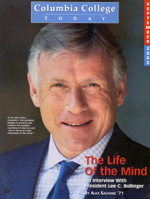|
|
|
ALUMNI PROFILE
Koppett on Baseball
By Alex
Sachare '71
Acclaimed sports writer and author Leonard Koppett
’44 addressed the fourth annual meeting of the
International Association of Sports Economists, which was held at
SIPA on July 11–12. Koppett, who has been honored by both the
baseball and basketball Halls of Fame, spoke about how Major League
Baseball could solve its ongoing labor dispute “if both sides
wanted to.”
 |
|
Leonard
Koppett '44
PHOTO: ALEX SACHARE '71
|
Koppett’s proposal centers around team owners and players
reaching an agreement on how to split baseball’s gross
revenues — what percent would go toward player salaries and
what percent would remain with the owners. “Basketball and
football already have done it, so it’s not impossible,”
Koppett says of the two sides agreeing on such a division.
“At some point, they will be desperate enough to do it. Then
each side can decide on its own how to split up its share of the
gross, and they’ll be out of the box of having to approve
each other’s actions.”
Once this is achieved, Koppett suggested additional steps that
he feels should be taken to restore baseball as the “national
pastime.” He would make every player a free agent every year,
perhaps setting a limit on each team’s signing of designated
“premium players.” He advocates reorganizing the minor
leagues into a large feeder system for all of baseball with each
team drafting from this central pool, thus reducing the cost of
player development for each team and, at least ideally, improving
competitive balance among teams. He opposes inter-league play,
wants every postseason series to be best-of-7 games and would
restore the independence of the two leagues as far as umpiring is
concerned. “Finally, I would tell television to just cover
the games and not try to dominate them. Weekend postseason games
would be played in the daytime. In-season games would be televised
regionally. Baseball would set the starting times that are best for
all, not just television. And if TV wants to give less money to
baseball, so be it. Baseball would be better off in the long
run.”
|
|
|





